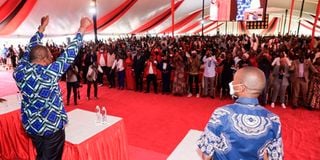Premium
Facing Mt Kenya: Uhuru’s reckoning with the power of the grassroots

President Uhuru Kenyatta acknowledges greetings when he hosted thousands of youth leaders from across the country at State House, Nairobi, yesterday. He was accompanied by ICT Cabinet Secretary Joe Mucheru (right).
Uhuru Kenyatta’s tours of the Mt Kenya region have become intensely discussed and minutely examined affairs. A freshman of Kenya’s politics would be forgiven for supposing that Kenyatta, like his deputy William Ruto or his client Raila Odinga, is in the race to succeed Kenya’s sitting President come the August poll, and must prevail over his rivals in the mountain-climbing phase of the contest.
She would be utterly mistaken for this pardonable inference; not only because Kenyatta is the serving President poised on the cusp of ineluctable retirement, but also because he is a famous son of Mt Kenya, who shot meteorically to become the region’s foremost political champion.
In that case, why have Kenyatta’s forays into his putative motherland acquired such intensely focal newsworthiness?
Naïve elitist analysts proceed from the assumption that a regional kingpin’s leadership of his constituency is premised on regimented control attributable to a certain patrimonial absolutism.
Accordingly, the populace at the grassroots is absolutely in thrall to the arbitrary power of this mighty individual. Political behaviour, including voting propensity, would therefore be arbitrarily determined by this potentate.
Policy design
This understanding of leadership for long underpinned policy design and implementation approaches, leading to the retrofitting of post-independence elected leaders into facsimiles of colonial paramount chiefs.
The notion of unilateral potency of political leaders is implicit in frameworks such as the criminal law of incitement.
More explicit, however, was the contrivance by the Chief Prosecutor of the International Criminal Court to try Kenyan politicians according to a command theory imputing absolute arbitrary control of all their constituents’ behaviour. Such stylised portrayal of prevalent power dynamics and political relationships is perennially confounded by a notorious phenomenon: ‘kwa ground’, or the actual facts on the ground.
On this basis, the rationale of Kenyatta’s sensational forays into his native backyard is overwhelmingly counterintuitive. Why would a veritable political titan consider it imperative to ply his devotees with redundant suasions?
It turns out, however, that, so to speak, the situation on the ground is indeed different. Thus there is nothing redundant whatsoever about a regional colossus engaging his grassroots constituency, because such constituencies are never inert appendages of a chief’s whim. Rather, the grassroots demonstrate tremendous agency, actively engaging in political exchange and vigorously advocating their interests, as Michael Johnston says, in ways that cannot be ignored.
Frightful bombast
Elitist analysts are unlikely to spot the faintest indication of such a possibility in the bedlam of typical Kenyan political events.
To be fair, the evidence of this engagement is subtly embedded in frenzied dancing, astonishing logorrhea, frightful bombast, vulgar entendre and other extravagant histrionics. Moreover, it takes the deliberate adoption of an alternative perspective to decode highly effective political meaning-making in such clamorous orgies.
The needful perspective allows the analyst to appreciate the ensuing political spectacle as theatre and ritual, comprising a repertory of necessary performances understood to be politically meaningful.
At the political encounter, then, both the politicians gyrating and fulminating on the dais, and the crowd of citizens cheering, heckling and booing are protagonists in a lively negotiation of a common political position.
In the apparent melee, the terms of this negotiation underpin the exchange, bargaining and settlement of expectations over the course of a campaign.
The political rally, with all its outward vulgarity and untidiness, is a synoptic spectacle of this intriguing intercourse.
It makes possible the innovative performance of diverse propositions, aspirations, claims and values by both the political leader and the grassroots ‘audience’.
Successful depiction of appropriate attributes engenders immediate approbation, while the opposite provokes eloquent disapproval.
Stormy political rally
Deployment of charisma and oratory is insufficient unless it plugs efficiently into the dramatic possibilities of every political moment, dexterously interpreting, then leveraging the subtlest of cues in ways that underscore the politician’s fluency in the grassroots’ performative vernacular.
This is how constituencies recruit and affirm their champions. In turn, it is the reason politicians are viscerally seduced by the siren call of the throbbing, stormy political rally. It is no accident that Kenya’s titanic political heavyweights are also virtuosos of the ripe, irrepressible political gathering and campaign trail.
Both a politician’s leadership and his political posture are intensely negotiated at the grassroots through the ritual of the rally, among other necessary performances.
The elitist perspective attributing unilateral potency to politicians, seen as capable of arbitrarily patronising inert and pliable constituencies holds scanty explanatory power when confronted with Kenyatta’s ‘Facing Mount Kenya’ scenario. Yet if the bean-spilling forays are understood to be Kenyatta’s bid for fresh negotiations to extend or renew his tenure as the region’s political champion, why, the matter acquires abundant clarity!
The political rally distils the wisdom of the ground: the grassroots are the leader, and the leader, their agent.
The writer is an advocate of the High Court and a former State House speech writer. @EricNgeno





